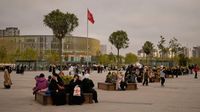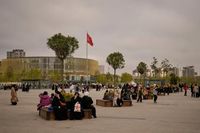A powerful 6.2 magnitude earthquake rattled Istanbul on Wednesday, sending tremors through Turkey's largest city and prompting widespread evacuations. The quake, one of the strongest to hit the metropolis in recent years, struck at 12:49 PM local time (09:49 GMT), according to Turkey's Disaster and Emergency Management Agency (AFAD). While there were no immediate reports of damage, the impact was palpable across the city of 16 million, which straddles the European and Asian shores of the Bosphorus Strait.
Residents poured out of buildings as the ground shook, seeking refuge in parks, on doorsteps, and in the streets. A wave of aftershocks further unsettled the city, leading some businesses in the central districts to close their doors. The epicenter of the quake was located in the Silivri area, approximately 80 km (50 miles) west of Istanbul, and at a depth of 6.92 km (4.3 miles), according to AFAD.
Transport Minister Abdulkadir Uraloglu reported that initial inspections did not reveal any damage or adverse conditions on highways, airports, trains, or subways. However, broadcaster TGRT reported that one person had been injured as a result of jumping off a balcony during the quake, which occurred during a public holiday in Turkey. The Istanbul governor's office stated that there had not been any reports of buildings collapsing and called on people to remain calm and not approach potentially damaged structures.
Despite the lack of serious damage, the quake caused panic among residents, with authorities reporting that 151 people were injured after jumping from heights due to fear. Fortunately, none of these injuries were critical. An abandoned building in the central Fatih District collapsed, but no injuries were reported from that incident.
Ali Yerlikaya, Turkey's interior minister, stated that the quake lasted a total of 13 seconds and that 51 aftershocks had been recorded so far, with the largest measuring 5.9. He urged the public to stay vigilant against possible aftershocks. The tremors were felt as far away as the Romanian capital of Bucharest and the Bulgarian capital of Sofia, approximately 300 miles away.
This latest earthquake has revived memories of previous seismic disasters in Turkey. In February 2023, a devastating 7.8 magnitude earthquake struck southern Turkey and northern Syria, killing more than 55,000 people and injuring over 107,000. Hundreds of thousands remain displaced, with many still living in temporary housing as a result of that quake. The latest tremor also echoes the catastrophic 1999 earthquake near Istanbul that killed 17,000 people, intensifying fears about the city’s preparedness for future seismic events.
Turkey is situated at the junction of three tectonic plates, making it one of the most seismically active regions in the world. The North Anatolian fault, which runs perilously close to Istanbul, has a history of causing significant earthquakes. Experts have warned that the city, with its dense population and aging infrastructure, is particularly vulnerable to such natural disasters.
In response to the ongoing threat, both the national government and local administrations have initiated urban reconstruction projects aimed at fortifying buildings at risk and demolishing those deemed unsafe. Following the 2023 disaster, there has been a concerted effort to improve the city’s earthquake preparedness, but many residents remain anxious about the potential for another catastrophic event.
As the dust settles from Wednesday's quake, President Tayyip Erdogan has been monitoring the situation closely and has issued advice on what citizens should do in the event of further tremors. The Turkish government continues to assess the situation, ensuring that emergency services are on high alert as aftershocks continue to rattle the city.
While the immediate impact of the earthquake appears to have been mitigated, the event serves as a stark reminder of Turkey's precarious position on the seismic map and the ongoing need for vigilance and preparedness in the face of nature's unpredictability.
As Istanbul's residents begin to return to their daily routines, the echoes of the past remind them of the fragility of safety in a city that has long been shaped by the forces of nature.









